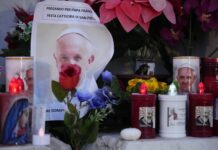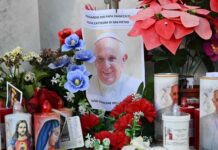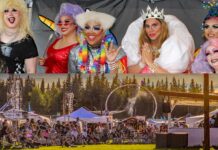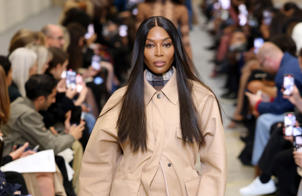These days, if you end up on an elevator with comedian Joel Kim Booster, he might give you this elevator pitch for his new film, “Fire Island.”
“It’s about a group of friends who go to a fantastical gay island trying as hard as they can to fall in love and get laid. Then chaos ensues.”
It’s probably not fair to ask Booster — who both wrote the film and stars as the main character, Noah — to reduce “Fire Island” to a two-sentence pitch. After all, the queer rom-com, which begins streaming on Hulu this Friday, has been generating a lot of buzz for many reasons — and the right kind of buzz at that.
“Fire Island,” a reference to the iconic gay-friendly vacation destination off of New York’s Long Island, is one of the rare gay-themed rom-coms from a major studio, in this case Searchlight Pictures. Another high-profile gay rom-com, Universal Pictures’ “Bros” — directed by Nicholas Stoller and written by Stoller and Billy Eichner — is set for a Sept. 30 release.
Besides being that cinematic rainbow-hued unicorn, “Fire Island,” much like “Bros,” is that other rarity: a queer romantic comedy with queer actors. In the case of “Fire Island,” the cast includes some of the industry’s top queer actors, Asian or otherwise, including Booster, “SNL’s” Bowen Yang, TV actor Conrad Ricamora (“How to Get Away with Murder”), theater actor Nick Adams (“Priscilla, Queen of the Desert” and the Lincoln Center revival of “Falsettos”) and one Margaret Cho.
The who’s-who caliber of this cast is not lost on Booster.
“It was really important that this friends group felt authentic,” Booster said by phone from his home in Los Angeles. “We saw every actor — straight and gay. Every time a gay actor came in, the authenticity just felt more there, more real. There aren’t a lot of gay rom-coms and certainly not one by a major studio, so it wasn’t hard to get these gay actors on board.
“Having Bowen be a part of it is special, and having Margaret Cho wanting to be a part of it? That’s magical. She’s an icon and a legend, and it’s very surreal for her to be a part of this. I wouldn’t be doing what I’m doing if it were not for her.”
What he’s doing pretty much keeps him busy — very busy, actually.
A regular on the stand-up comedy circuit, he’s appeared on “Conan” and had his own stand-up special on Comedy Central. He’s made regular appearances on NPR’s “Wait, Wait… Don’t Tell Me!” He is co-host of the podcast “Urgent Care with Joel Kim Booster + Mitra Jouhari.” This weekend, “Fire Island” — directed by Andrew Ahn (“Spa Night”) — finally streams on Hulu. Starting June 16, he has a five-show engagement at American Comedy Co. in San Diego’s Gaslamp Quarter.
And if all that weren’t enough: On June 21, his next special, “Joel Kim Booster: Psychosexual,” makes its debut on streaming giant Netflix.

Matt Rogers (from left), Bowen Yang and Tomas Matos in a scene from the film “Fire Island.”
(Jeong Park / Searchlight Pictures)
‘Really a conversation’
On a recent Tuesday morning, Booster beamed with excitement about being back on the stand-up circuit.
“It’s really exciting to come to San Diego days before my special comes out,” Booster said. “I’ve been building new material, so it’s great to get that out there.”
Audiences can expect “kind of a half and half — with some old material and some new, never-before-heard material that I’ve been workshopping in L.A. So it’s really exciting for me to able to work out some new stuff and work in some of the greatest hits.”
Days before this interview, Booster and Co. appeared at RuPaul’s DragCon in Los Angeles. Think Comic-Con, but more sequins and stilettos. It’s billed as a “convention that celebrates the art of drag, queer culture and self-expression for all.”
“It was a lot of fun,” Booster said. “I’ve never been to DragCon. I was grateful that people came to our panel. There were a lot of panels to attend, and a lot of drag queens to see, so the fact they showed up to hear about our film, I’m grateful.”
Booster has a lot to be thankful for. For one, things are finally opening back up, and for a performer, that’s been a god-send.
“It was really tough for me during lockdown because so much of what I talk about and write comes out of my interaction with the audience,” he said. “I’m not one of those comedians who writes stuff and repeats them verbatim from one show to the next. To me, it’s all about that collaboration with the audience. It’s a really a conversation for me. So without that during lockdown, I wasn’t able to develop a lot of material. That’s just not how I work.”
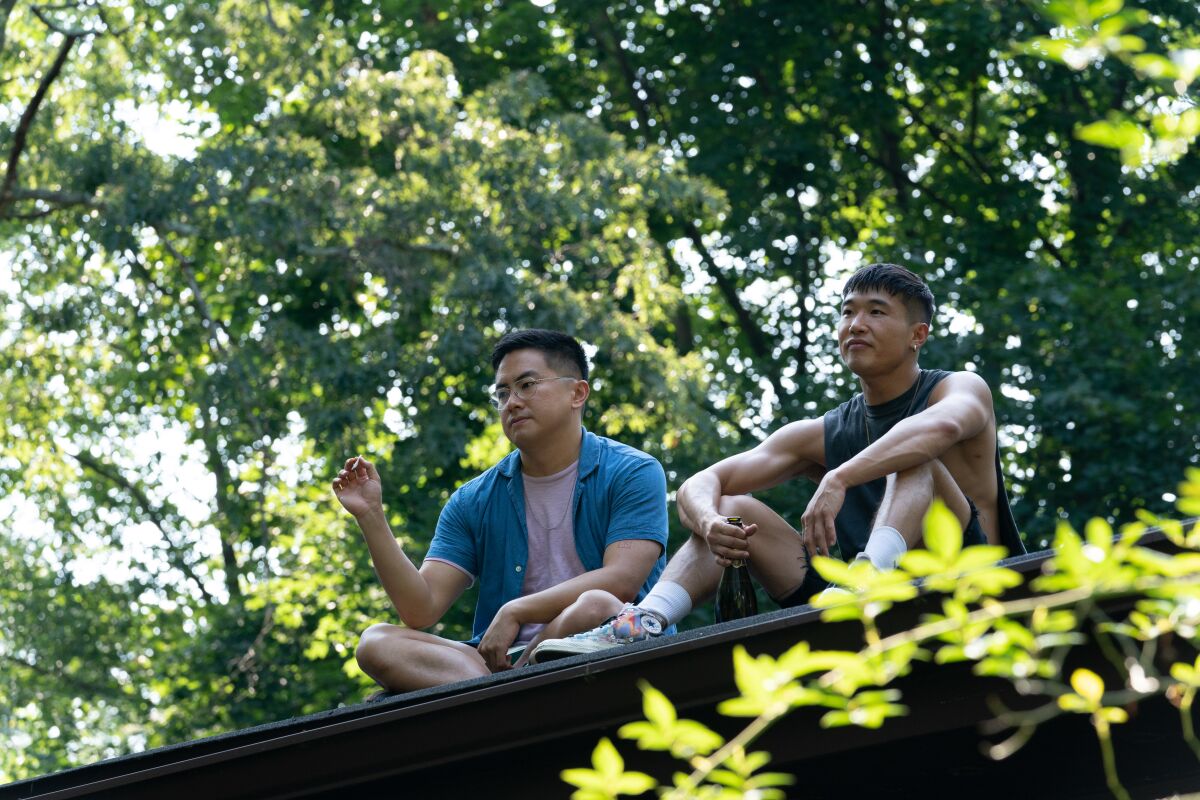
Bowen Yang and Joel Kim Booster in the film “Fire Island.”
(Jeong Park / Searchlight Pictures)
Intersection of identities
Joel Alexander Kim Booster was born in 1988 in South Korea and was adopted as a baby by an American couple. His upbringing, he admitted, would surprise many, mainly because it wasn’t the kind of environment that would have typically nurtured a comedian.
“It’s funny, I don’t know if growing up, people would have called me funny,” he said. “I was homeschooled until I was in high school,” raised in what he’s called a “conservative, White, Evangelical Christian family” in Plainfield. Ill.
“But I guess part of what made me funny was my bluntness. I didn’t know how to keep my mouth shut. I didn’t know what was appropriate to say and what wasn’t appropriate to say. I was the kid who asked the questions you weren’t supposed to ask because I really didn’t know any better. And I guess I still don’t.”
The juxtaposition of a conservative upbringing in a White family led the young Booster to a lifelong search for identity, especially for an adopted Korean boy who just happens to be gay. All that, and much more from his life, informs his comedy — a style he’s described as part autobiographical, part commentary on classism and racism in the gay community.
In past interviews, he’s joked that he knew he was gay before he knew he was Asian, but that, he said in a serious tone, wasn’t without its challenges.
“When you exist at the intersection of a lot of different identities, like I do, you’re always trying to triangulate … . It’s a very complicated calculus you have to do everyday,” he said. “Are they coming to me because I’m gay, or because I’m Asian, or because I’m gay and Asian?
“I try not to focus on the day-to-day, but let’s face it, Asian men are treated differently than White men, gay men are treated differently than straight men, and Asian gay men are treated differently as well. There are many different ways to exist when you’re at this intersection, but I’m proud of who I am, and I don’t plan on changing for anybody.”
Even so, he admits it’s not easy.
“It does take a lot of organizing my thoughts and balancing different parts of your self,” Booster said. “Therapy helps and comedy helps a lot, honestly. To be honest, a lot of these things I worked out because of comedy. Did I struggle? Yes. But these days, I’d say things are a bit more settled at this point. It’s not something I write much about anymore comedically, but that is always running in the background.”
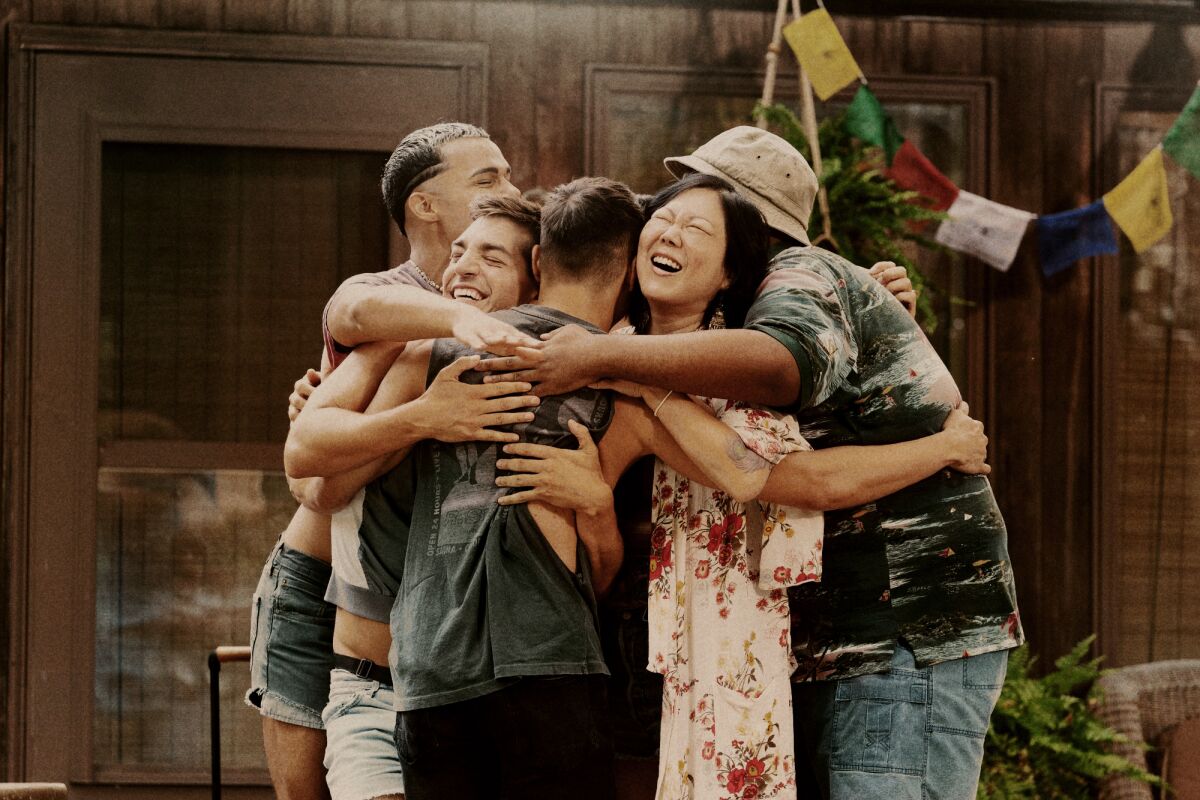
Tomas Matos (from left), Matt Rogers, Joel Kim Booster, Margaret Cho and Torian Miller in “Fire Island.”
(Jeong Park / Searchlight Pictures)
Inspired by Jane Austen
Much of that tension and search for identity flows through “Fire Island,” which he created and wrote after being inspired by Jane Austen.
“It started very simply when I brought ‘Pride and Prejudice’ out during a trip to Fire Island in 2015,” Booster said. “I read it that week, and it just struck me as: ‘Oh, my god, it felt so relevant.’ Gay guys being on Fire Island and observing how gay men oppress and separate each other based on race, body image and actual wealth. Who’s better than other people? How on this island, there was this class system, but this time among gays. It was a slow burn, but I finally came up with a concept of modern-day class warfare and how, in the middle of that, two people could fall in love.”
In an interview with queer cannabis magazine Buds Digest published on 4/20, Booster said: “There are a lot of people who wanna dismiss this movie because it takes place on Fire Island. Specifically, I think there are a lot of queer, young people of color who don’t have the means because, let’s face it, Fire island is impenetrable economically for a lot of people. I think it was easier for us because we lived in New York and we had 16 friends laying around that could, you know, split a house with us. I get that. I understand what the Island’s reputation is.”
The concept of a cultural and economic divide on Fire Island — and about who’s able to go and why — became apparent to Booster and his friends, including Yang, during their early visits.
“It’s less apparent now, but yes, you still see a lot of self-segregation,” Booster told the Union-Tribune. “I go with my best friends every year. That is empowering to go with your chosen family. All of that other stuff — race and class and masculinity and body image — all of that is so arbitrary when you’re with your chosen family.”
Beyond that, he said, going to a place like Fire Island is liberating. In a previous interview, Booster has said: “Everybody should be able to have a week surrounded by gay people and no straight people.”
Asked to expound on that, he said: “A lot of gay people don’t realize how much weight they carry around navigating a heterosexual world every day. Society is built for straight people, not built for us. On Fire Island, you’re in a world where you can be yourself, and that’s transformative.”
Filming on Fire Island presented its own set of challenges: “There was a lot of weather, a lot of rain, a lot of waves. Shooting on the island was not easy. Weather was very finicky. The island is its own kind of character. I was very proud of the crew and how they were able to problem-solve in the moment.”
Despite that, he said, creating and filming “Fire Island” will always mark a milestone moment for him and for Yang as gay Asian comedic actors.
“The No. 1 most rewarding part was getting to do this with Bowen,” Booster said. “Conventional wisdom in the industry is: ‘They’re the same. They’re both gay. They’re both Asian. They’re both funny.’
“We’ve gone in for the same parts. We’ve never been in the same movie. … This entire process — getting to do this with my friend — was a way to prove how different we are even though we check the same demographic boxes.”
‘Joel Kim Booster LIVE!’
When: 8 p.m. June 16, 7:30 p.m. and 9:30 p.m. June 17, 7:30 p.m. and 9:30 p.m. June 18
Where: American Comedy Co., 818 Sixth Ave., San Diego
Tickets: $10 (21-and-up only with a two-drink minimum)
Online: americancomedyco.com
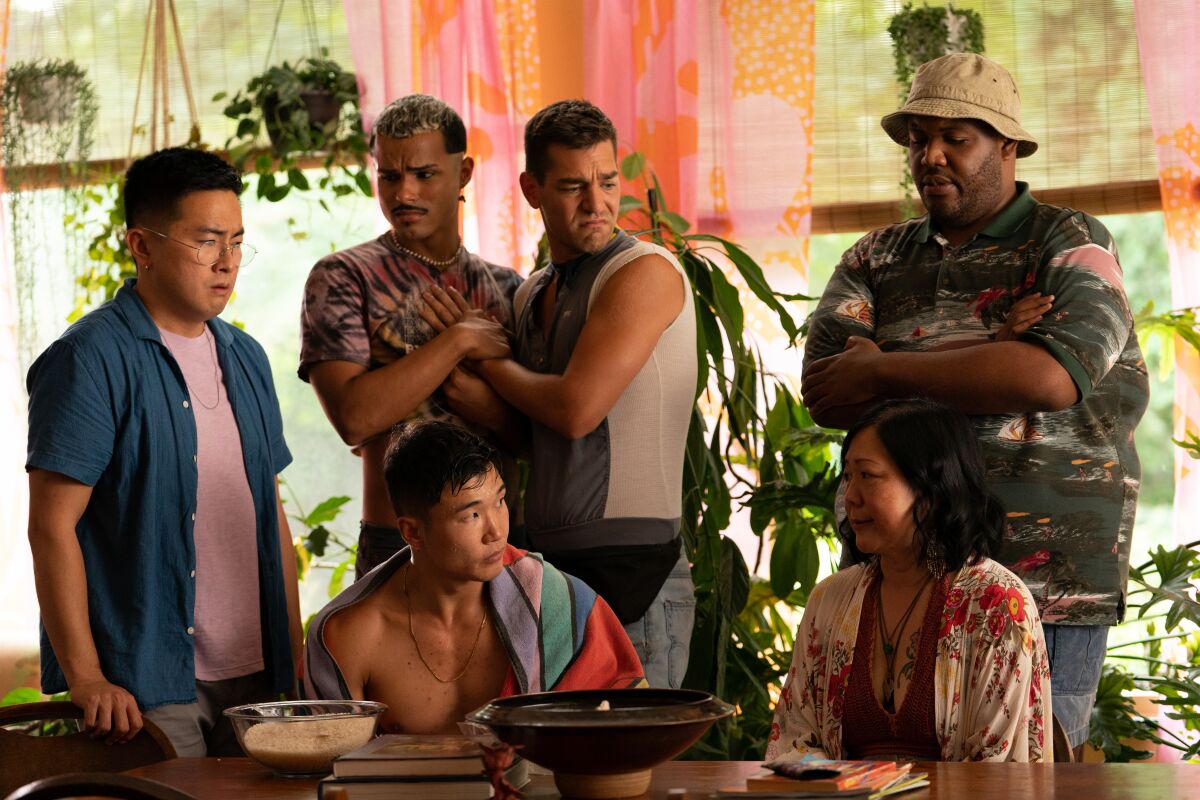
Bowen Yang (from left), Tomas Matos, Matt Rogers, Torian Miller, Joel Kim Booster and Margaret Cho in the film “Fire Island.”
(Jeong Park / Searchlight Pictures)


